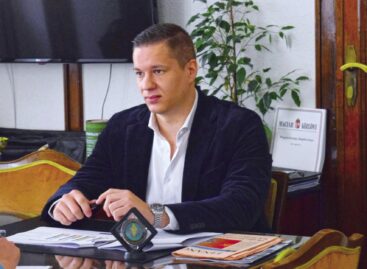Magazine: Business Days 2020 – Our conference was not cancelled… Vol. 2
E-commerce, drugstores and discount supermarkets were the topics of the day’s first roundtable discussion.
Changing consumption habits in the light of the pandemic

Nagy Sándor
elnök
Ecommerce Hungary
The ‘conductor’ of the morning concerts was Sándor Nagy, president of Ecommerce Hungary and a member of the Chain Bridge Club, who first asked Tünde Turcsán, FMCG director of GfK to give her presentation.

Tünde Turcsán
FMCG-director
GfK
She spoke about survey results from December 2019, which revealed that at global level consumers wanted safety, in Europe environmental consciousness was the main trend, while in Hungary conscious consumption was very important for shoppers.
Online shopping became more important

Péter Kurucz
retailer services director
Nielsen
Péter Kurucz, Nielsen’s retailer services director talked about the brutal 14-point drop in the Nielsen consumer confidence index in the 1st quarter of 2020, which was mainly driven by job prospects taking a negative turn. He said that consumers are already more worried about the state of the economy than their own health. The importance of online shopping increased in the spring period.
Lessons learned from the crisis

Veronika Tóth
director of strategy
and transformation
Auchan
Veronika Tóth, Auchan’s director of strategy and transformation told: shopper demand increased for e-commerce use. At the beginning of the COVID-crisis the company recruited new workers to be able to increase their online order and delivery capacity.

Zoltán Patai
managing director
Netpincér
Zoltán Patai, managing director of Netpincér opined that the most important thing in the spring was to react rapidly, and not only in the restaurant segment but also in the domain of food delivery. Currently Netpincér GO delivers in more than 30 cities and works with more than 3,000 couriers.
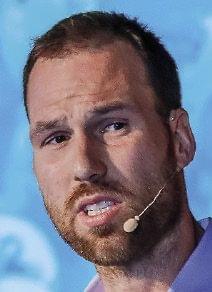
Viktor Nagy
managing director
Immunetec
Viktor Nagy, European and World Champion water polo player and managing director of Immunetec introduced the company’s hand sanitiser product to those present. The hypoallergenic cream was developed by Hungarian experts and offers 4-5 hours of protection to users.
Developing the online channel is essential

János Makkay
managing director
kifli.hu
János Makkay, managing director of Kifli.hu Shop revealed that basically they are a technology company and this influences how they view the market, too. It is the consumer who stands in the centre of their thinking.
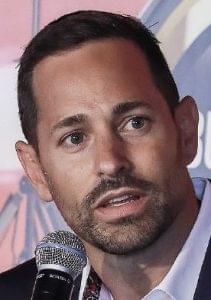
Bernhard Haider
country manager
ALDI
Bernhard Haider, managing director of Aldi Magyarország underlined that the trends which had started already before the pandemic speeded up because of it. Since many shoppers saw their incomes drop, people have less money to spend and product price has become more important than ever before.
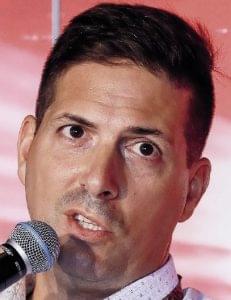
László Flórián
managing director
Rossmann
László Flórián, managing director of Rossmann told: during the crisis they were focusing on keeping and bringing back customers. The tool for the former was a well-planned loyalty scheme, while the latter they intended to do by means of promotional prices.
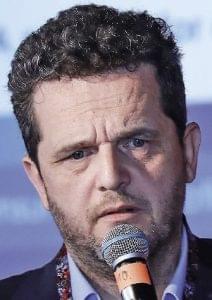
Tamás Szendrő
managing director
Edenred
Tamás Szendrő, managing director of Edenred gave a presentation about employee benefits and sales promotion. No less than 4,000 employers are working with them, who have 60,000 employees; the company has business relations with nearly 30,000 stores and 4,000 trade businesses.
Development in the online segment

Dávid Janó
head of e-commerce
SPAR
The discussion continued with Dávid Janó, head of e-commerce at SPAR sharing his observation that market players with an online marketplace could make serious progress recently. He added that during the pandemic it became easier to recruit new workers than it had been before.
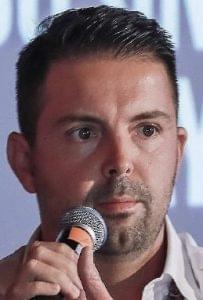
Dr. Richárd Andrejszki
CEO, Chef Market
Dr Richárd Andrejszki, CEO of Chef Market explained that in the spring they tried their hand at online retail service, and they intend to continue their presence in this segment. He believes that one must never stop developing in the field of information technology. Despite being a logistics company, Chef Market has a superb online shop that now utilises B2B processes in serving consumers too.
Adaptation is the key to success

Szilvia Krizsó
communication consultant
and trainer
Szilvia Krizsó, communication consultant and trainer was the host of the afternoon discussions. The topic was first COVID-19 and then sustainability, and the first opinion came about the COVID-situation,
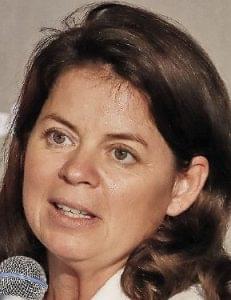
Ildikó Balázs
head of corporate
affairs
Auchan
from Ildikó Balázs, head of corporate affairs at Auchan. She told: their main goal was to ensure uninterrupted product supply and to convince shoppers that they are safe when they shop in an Auchan store.
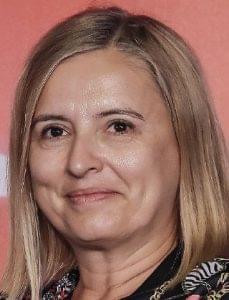
Csilla Zombory
head of quality and
environmental management
SPAR
Csilla Zombory, head of quality and environmental management at SPAR said she was surprised to see how quickly and effectively they could adapt to the new situation.
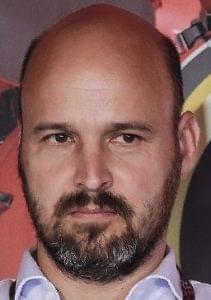
Gábor Tompa
corporate communication
and public affairs director
Nestlé
Dr Gábor Tompa, corporate communication and public affairs director of Nestlé was of the opinion that they were in a much easier situation than retailers. They paid special attention to protect their more than 2,000 factory workers in three factories from the coronavirus.
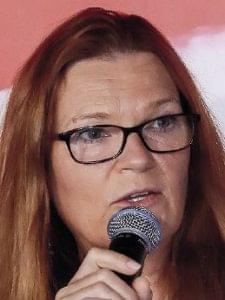
Éda Pogány
head of business
sustainability
in Eastern Europe
Syngenta
Éda Pogány, head of business sustainability of Syngenta in Eastern Europe spoke about how they supported farmers and helped them in their work on the land day by day.
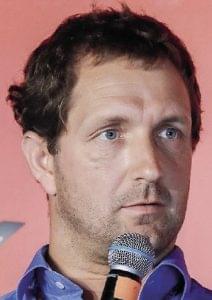
Gergely Hankó
ügyvezető igazgató
KSZGYSZ
Gergely Hankó, managing director of the Hungarian Association of Environmental Enterprises (KSZGYSZ) reported that the coronavirus increased their workload by 150-200 percent. The association has 245 members and in March the biggest challenge was managing the hazardous waste from hospitals.
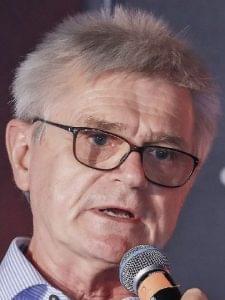
Miklós Nagy
secretary general
CSAOSZ
Miklós Nagy, secretary general of the Hungarian Association of Packaging and Materials Handling (CSAOSZ) explained that they had innumerable tasks in the spring. The Operative Board contacted CSAOSZ via the Ministry of Agriculture and requested information about every packaging-related matter that might jeopardise the safety of food supply.

Bernadett Strasser-Kátai
owner-MD
Real Nature
Bernadett Strasser-Kátai, owner and managing director of Real Nature told: the pandemic required flexibility from them and they had to supply the domestic market with food products in a situation when production stopped in certain factories.

This September was also special for the weather that reminded us of summer, which is why our BBQ-party also resembled a nice summer garden party
Focusing on sustainability
Ms Pogány informed in connection with sustainability that agriculture is responsible for 12 percent of global greenhouse gas emission, from which livestock farming has a 70-percent share. Mr Hankó shared the news that companies contact them every week to ask for advice on how to make their business operations more sustainable. Ms Strasser-Kátai talked about their production process: sustainability aspects are taken into consideration in every phase, and the packaging is made of biologically degradable material. Ms Balázs spoke about Auchan phasing out single-use plastics this April, because of which they lost market, but at the same time contributed to the cause of sustainability.
Plastics – bans and stricter rules
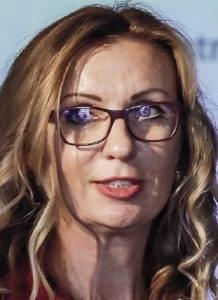
Izabella Bauer
commercial director
BS Plastic
As part of the roundtable discussion Izabella Bauer, commercial director of BS Plastic gave a presentation, which shed light on the fact that the European Union didn’t ban polyethylene single-use bags and shopping bags; still there is a crusade against these in the media. She added that Hungary decided to ban polyethylene too.
Mr Nagy’s reaction to the presentation was that demand is increasing for packaging. He defined three criteria for sustainable packaging: maximum product protection, reducing the ecological footprint and keeping raw materials in circulation as much as possible.
Dr Tompa informed that Nestlé invested lots of money in developing packaging material that meets these criteria and called attention to the importance of educating consumers. Ms Zombory said SPAR cooperated with Nestlé in this field in the form of a publication about how to collect waste selectively at home. Work in this section ended with another presentation:

László Rónai-Horst
managing director
Mercarius
László Rónai-Horst, managing director of Mercarius broke the news that 2.1 million electric cards were sold in 2019, which means that sales were up 9 percent. By the end of last year there were 7.2 million electric passenger cars used – 1 percent of the global car stock.

Zsolt Szmolinka
CEO
United Call Centers
On Wednesday afternoon the third speaker was Zsolt Szmolinka, CEO of United Call Centers, who introduced how a modern call centre can contribute to sustainability and how it can support sales. He spoke about helping FMCG companies in cost cutting, performance improvement, uninterrupted business operations, brand building and language barrier free work.
Star performers on the stage
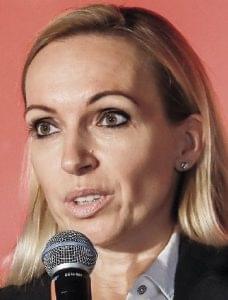
Dr. Almási Kitti
klinikai szakpszichológus
At the end of the day a surprise duo stepped on the stage: clinical psychologist Dr Kitti Almási and clinical psychologist and psychoanalyst Annamária Tari shared their professional experiences about the anxieties and fears caused by the coronavirus pandemic in both individuals and business organisations, talking about the home office phenomenon in detail.
Dr Almási explained that the whole situation is so new and unexpected that it is very difficult to communicate credibly – and to convince employees to comply with new rules and to take on new habits.

Tari Annamária klinikai pszichológus, pszichoanalitikus
Ms Tari said: during the first wave when everyone was really scared there was less fake news and anti-face mask sentiment as now. After about two months people got tired of the pandemic scare and started questioning everything.
Wednesday ended with a BBQ dinner, the presentation of the Lifetime Achievement Award and celebrating birthdays. Rock band Irigy Hónaljmirigy performed live courtesy of Rossmann.
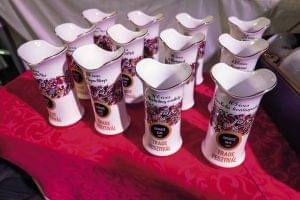
Birthdays were also celebrated this year. We greeted them as the stars of the Trade Festival on stage with uniquely decorated Hollóházi porcelain vases.

Irigy Hónaljmirigy was responsible for the Wednesday party mood
The sustainability of supply chains is a top priority for Mars – and not even the pandemic can change this

Attila Sófalvi
marketing director
Mars Magyarország
Attila Sófalvi, market director of Mars Hungary: ‘The coronavirus pandemic showed the flaws of our social and economic systems. Mars has decided to find sustainable solutions for sourcing cocoa, mint and palm oil. While we are busy battling with the hardships generated by the pandemic, we also keep working for our sustainability goal. This is why we are the proud sponsors of the sustainability roundtable of the Business Days conference once again.’ //
On stage: Sustainability
Before the afternoon roundtable discussion on sustainability the results of the Symbol of Sustainability 2020 competition were announced. Máté Molnár, media and marketing manager of Trade magazin gave a small speech on the importance of the topic and then Zsuzsanna Hermann, managing director and editor-in-chief of Trade magazin presented the prizes in the corporate and product categories (there were 19 entries altogether), plus there was a special award from TÉT Platform.
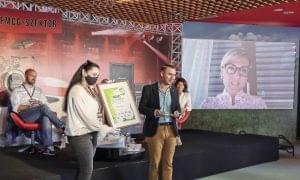
Those we could not take over the diploma in person, received our congratulations message on the screen
//
Lifetime Achievement Award 2020
In 2020 Zoltán Házi and István Matus won the Lifetime Achievement Award of Chain Bridge Club and Trade magazin. Sándor Baja, managing director of Randstad Hungary told about Mr Házi – who spent most of his 53-year career at Csemege Julius Meinl and the Budapest Wholesale Market – that his humane leadership style was legendary among both employees and suppliers. Kornél Saltzer, managing director of Dél-100 spoke about the many achievements of Mr Matus at Bestfoods, Unilever and Szentkirályi, praising him as an ethical, humane, honest and dedicated leader.
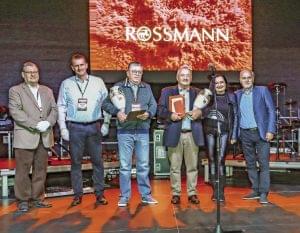
This year’s Lifetime Achievement Award was also special. For the sake of award winners’ safety, we delivered the awards at the BBQ-party instead of a gala dinner, plus we had more than one award winners. We congratulated to Zoltán Házi and István Matus, Lifetime Achievement Award winners of 2020 on the Rossmann-stage.
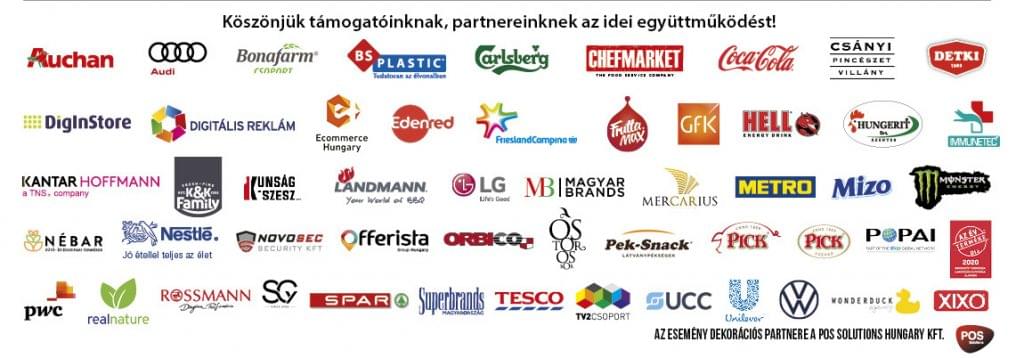
//
Related news
Climate change is not sparing grapes either, but its effects can be mitigated, according to Syngenta
Despite the decrease in the area under cultivation, grape growing…
Read more >The decline in Hungarian grape production may stop, according to an international agricultural company
The decline in Hungarian grape production may stop, but climate…
Read more >The market is not the primary driver of green corporate decisions in Hungary
The sustainability strategies and investments of domestic companies will be…
Read more >Related news
Retail trade walking on a new path
Bence Gerlaki, state secretary for taxation, consumer protection and trade…
Read more >A turnaround in promotions – brands are returning, but only with a discount?
At the April meeting of the Trade Marketing Club (TMK)…
Read more >A recuperating market in a changing consumer landscape
At the April meeting of the Trade Marketing Club (TMK),…
Read more >



